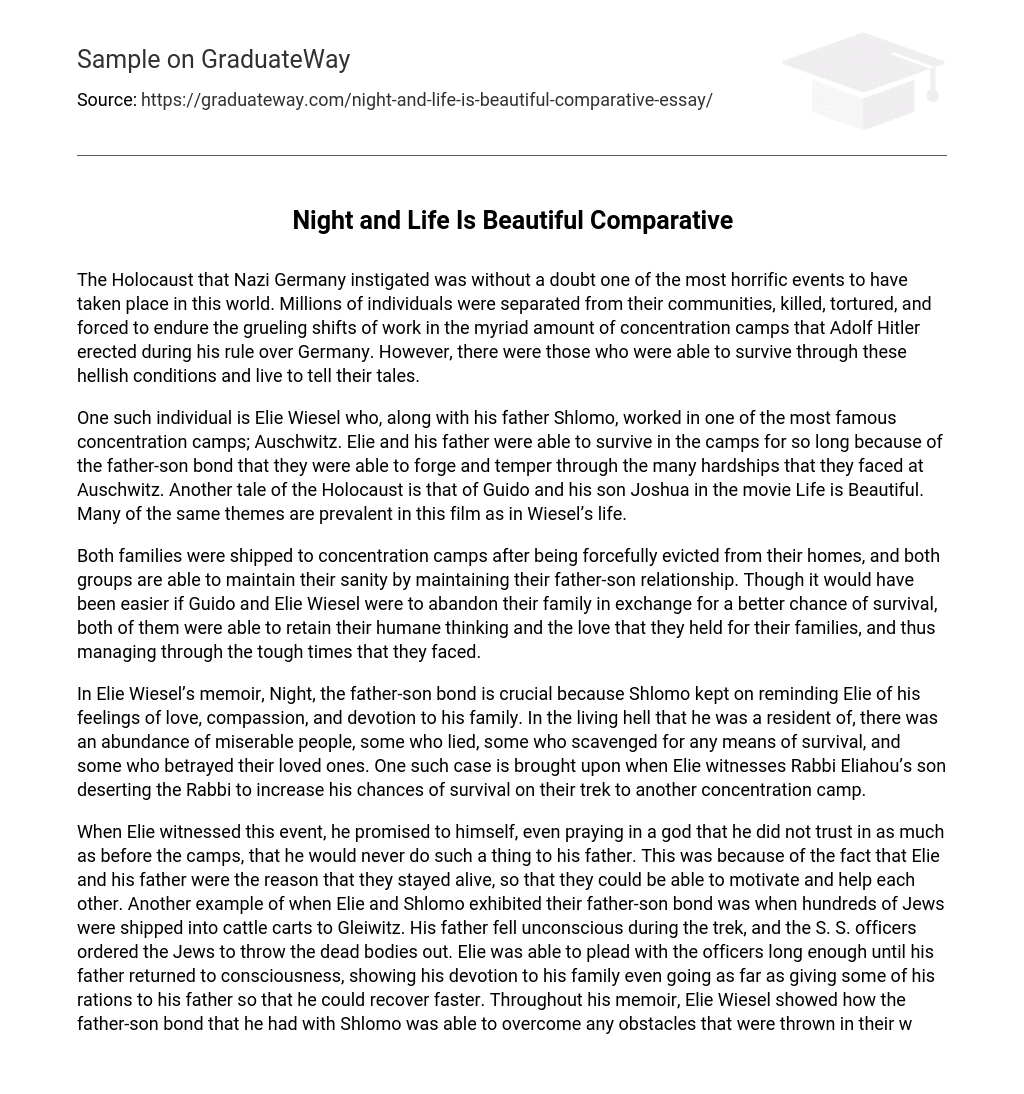The Holocaust, carried out by Nazi Germany, is widely considered one of the most horrific events in history. Many individuals were forcibly torn from their communities and suffered torture and death in Adolf Hitler’s concentration camps. Additionally, they were compelled to endure grueling work schedules. However, despite these unbearable circumstances, a small number of people survived and shared their stories.
Both Elie Wiesel, a Holocaust survivor, and his father Shlomo worked in Auschwitz, a well-known concentration camp. Their close relationship as father and son supported them through the difficulties they faced there. The movie Life is Beautiful tells the tale of Guido and his son Joshua during the Holocaust, drawing similarities to Wiesel’s personal encounters.
After being forcefully evicted from their homes, both families were transported to concentration camps. Despite the option of abandoning their families for a higher chance of survival, Guido and Elie Wiesel chose to maintain their father-son relationship as a source of strength and sanity. They were able to endure the hardships they faced due to their enduring love for their families and their refusal to abandon their humane thinking.
The importance of the father-son relationship in Elie Wiesel’s memoir, Night, is highlighted by the constant reminders Shlomo provides to Elie regarding his love, compassion, and dedication to their family. Within the appalling conditions of their living hell, numerous individuals suffered greatly, resorting to lies, scavenging for survival, and even betraying their loved ones. A particular instance that exemplifies this occurs when Elie observes Rabbi Eliahou’s son abandoning his own father in order to improve his chances of survival during their journey to another concentration camp.
After witnessing a specific event, Elie made a personal vow and even prayed to a god he no longer had as much faith in as before the camps. His promise was to never mistreat his father, whom he relied on for their survival and mutual support. Another instance demonstrating the strong bond between Elie and Shlomo as father and son took place during the transportation of numerous Jews in cattle carts to Gleiwitz. While on the way, Shlomo lost consciousness, leading S.S. officers to order the disposal of dead bodies by the Jews.
In an unwavering display of loyalty towards his family, Elie pleaded with the officers until his father regained consciousness. He even shared some of his rations with him to aid in his recovery. Throughout Elie Wiesel’s memoir, it becomes apparent how their bond as father and son prevailed over any challenges they encountered because their ultimate objective was not solely individual survival but rather surviving together.
In the film “Life is Beautiful,” Guido and his son are sent to a camp similar to the one where the Wiesels are held. However, unlike the Wiesels, Guido’s family is fortunate enough to have Dora, Guido’s wife and Joshua’s mother, with them. While Elie Wiesel’s mother and younger sister are immediately taken to a crematorium, Dora is able to work in the camp throughout World War II. When S.S. soldiers separate Guido and Joshua from their family, Guido convinces Joshua that the concentration camp is just a game they need to play in order to earn points. He tells Joshua to hide in the barracks, assuring him that it will help them accumulate more points. Meanwhile, Guido goes off to work in labor factories. By downplaying the seriousness of their situation and using humor, Guido not only makes it easier for Joshua to survive but also eliminates any fear or uncertainty he might have had.
Guido’s main priority was to protect his son, Joshua, after learning that the other children in their camp were killed when they were told to “take a shower”. This led Guido to sacrifice his own meals so that Joshua would be well-fed and healthy. By keeping Joshua safe, Guido also put his own life at risk. Despite the dangers, Guido’s selfless actions allowed Joshua to survive the camp and even win a tank, which Guido jokingly referred to as the first prize. Dora, Guido’s wife, clung to hope and willingly entered the concentration camp, fearing that she would be the only surviving family member and would never see them again. However, as her time in the camp dragged on, her hope dwindled.
She became aware that Guido and Joshua might not survive. However, while working one day, she was assigned to arrange the clothes of the children who had been killed. As she searched through the pile, she couldn’t find Joshua’s clothes. This absence of Joshua’s clothes in the massive mound provided some comfort, as it indicated that her family might be reunited. Eventually, her hard work paid off.
Without a doubt, the Holocaust stands as one of the most heinous crimes in human history. However, amidst the atrocities, certain prisoners drew motivation to survive from their families. “Night” memoir and “Life is Beautiful” movie both depict how the prospect of reuniting with loved ones played a vital role in their survival. Moreover, the characters’ love for each other bestowed meaning upon their existence. The presence of virtuous principles and even a modicum of faith contributed to the resilience of these individuals in face of tragedy.





